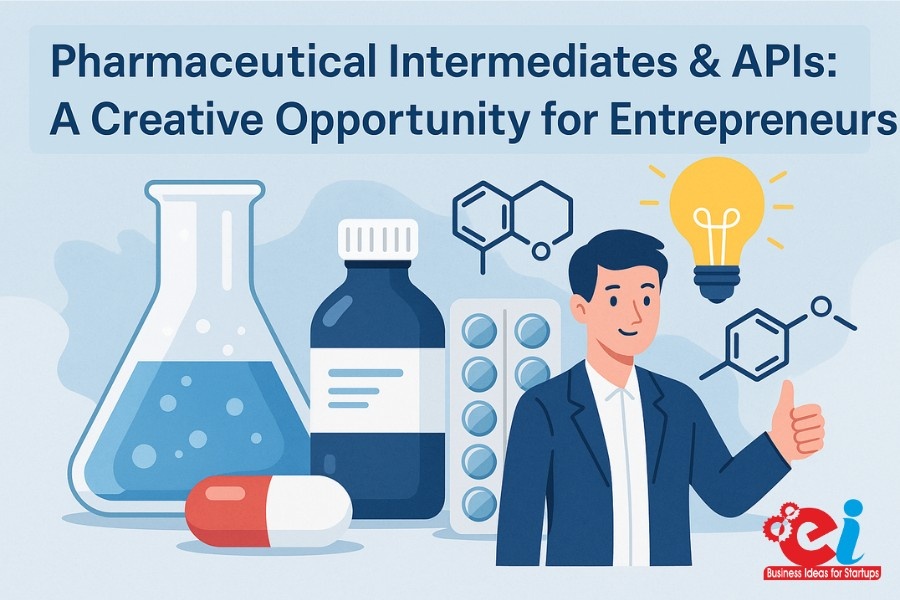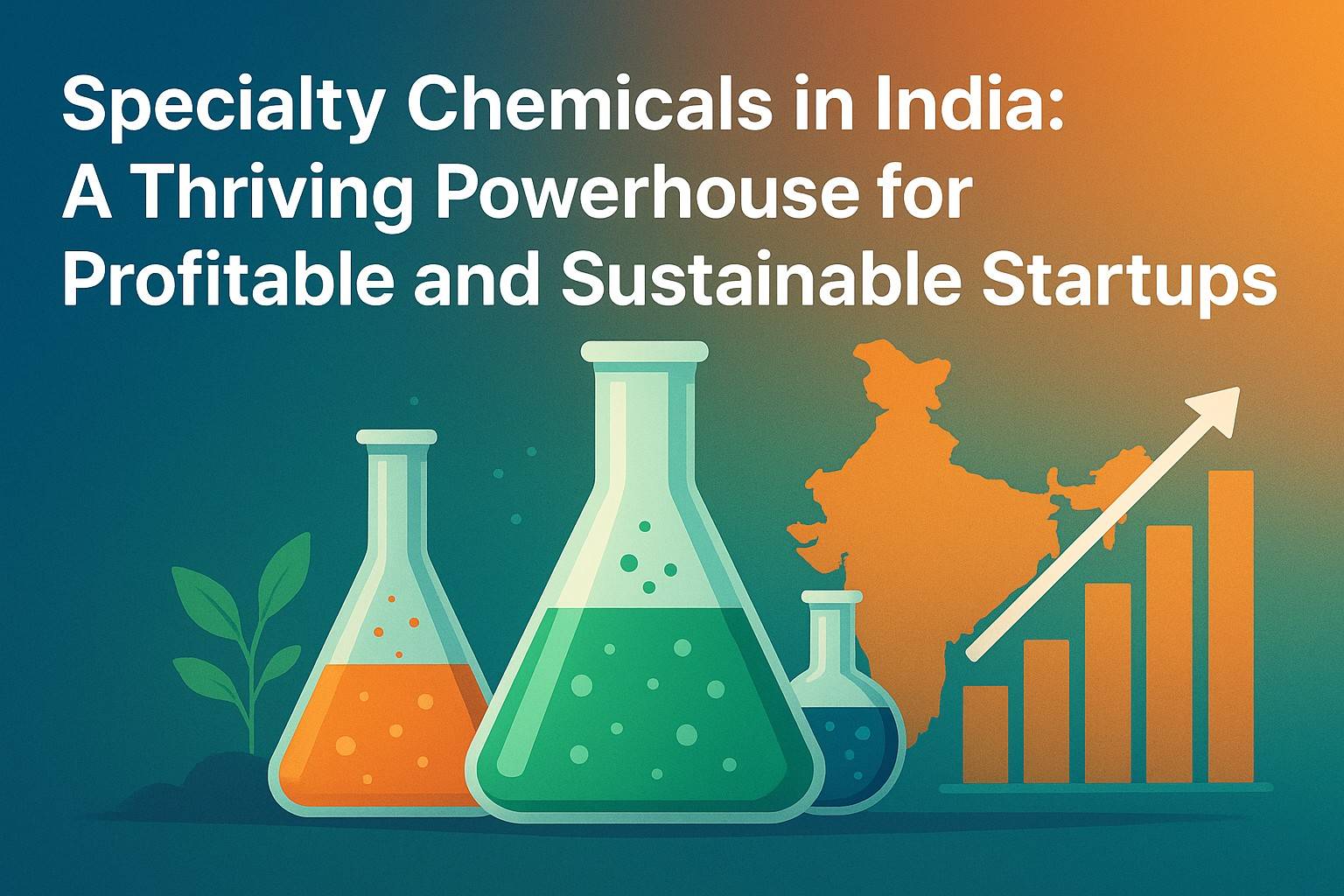The Indian healthcare and pharmaceutical Intermediates are rapidly growing in unprecedneted areas which makes needs for unexplored resoures. The immense growth for healthcare services and suppl, includes government policies and global sourcing transformations which as the primary reasons that have Pharmaceutical Intermediates & API Production. The outward focus of self sufficiency and backward integration is without a doubt raising India regarding being the pharmaceutical value manufacturing chain standalone, implying ecosystems that are entrepreneurial in nature, competitively sustained globally, and innovation in API and intermediates.
In this paper, I have sorted out the current environment and opportunities, the classical debate of issues, and the framework forward from the lens of a start-up.
Definitions of APIs and pharmaceutical Intermediates
• APIs (Active Pharmaceutical Ingredients) are considered those parts of the drug product which assert the biological function of it and are responsible for delivering the effects designed.
• Pharmaceutical intermediates are chemical intermediates which serve as the components for API synthesis.
In order to guarantee the efficacy, safety, and consistent regulatory approval of the drugs, the quality of the API and intermediate manufacturing needs to improve. By focusing on innovative processes and maintaining quality, start-ups can ensure that India emerges as a pillared central hub for drug manufacturing.
India’s Position in the Global API Production API Industry
The overall exports of APIs in India are in the range of 20% of the world export volume making India the single largest producer of APIs in the world. Despite this standing, India still imports ~65% of its API requirements from foreign countries – China being one of the major suppliers. This degree of dependence raised a strategic alarm during the pandemic. There has been a paradigm shift in ‘Indigenous API Production Policy’ post-COVID.
As for the PLI Scheme, it was launched with the intent of:
• Encouraging the establishment of new greenfield API units.
• Alleviating the dependency on imports.
• Providing financial incentives on incremental sales.
• Forming API clusters that can compete on a global level.
Related: Best Manufacturing Business Ideas in the Active Pharmaceutical Ingredient (API) Products Industry
Surge in the Number of Startups in API and Intermediate Manufacturing
The April 15, 2025 issue of Chemical Weekly outlines a number of developments that indicate aggressive startup opportunities.
• Viruj Chematrix Pvt. Ltd. is a Hyderabad based vertically integrated API and intermediate manufacturer of antiviral, antibacterial, cardiovascular, and antidiabetic molecules.
• Supriya Lifescience Ltd. Is actively constructing its portfolio of API products by pharmaceutical intermediates used in antibiotics, antihypertensives, antidepressants, and antiobesity drugs.
• Laurus Labs – Planned to spend ₹5,000 crore on a new API and specialty chemical facility in Andhra Pradesh. The production plant will focus on green chemistry, fermentation, and crop science chemicals.
Key Parts in Start-Up Investment
A. Antiviral APIs
Products for managing viral infections, such as Baloxavir Marboxil and Daclatasvir, have greatly increasing demand due to the rising prevalence of chronic viral diseases.
B. Cardiovascular & Diabetics APIs
With India emerging as the diabetes capital of the world, APIs such as Ezetimibe, Imeglimin, and Finerenone have scalable and evergreen business models.
C. Oncological APIs and Intermediates
These medicines are underdeveloped in India. Ebruinib, Ruxolitinib, and Enzalutamide provide a good base for high-value, low-volume new ventures.
D. Veterinary Science APIs
Vetrinary market APIs like Closantel have increasing international demand, presenting AVE for entrepreneurial new ideas.
Competitive Advantages of Indian Startups
Economic: Reduced expenses of operations in India creates a competitive edge in foreign markets.
Skilled Employees: There are Pharmacists, Chemists, and Engineers qualified in GMP, FDA, and EUGMP standards.
Contract Manufacturing Model: Startups can operate as third-party manufacturers alongside leading drug companies.
Closest to Markets: Proximity to Southeast Asia, Africa, and the Middle East – all of which have huge unmet needs for generics and low-cost medicines.
Government Assistance & PLI Schemes
Government of India is offering:
• ₹6,940 crore PLI for 53 essential APIs.
• Bulk drug parks cluster development with Himachal Pradesh, Gujarat, and Andhra Pradesh.
• Quick environmental clearances.
• Incentives for R&D and backward integration.
With these schemes, funded start-ups are able to reduce their expenses by 20-30% on setting up.
Market Size and Growth Potential
The Indian API market was estimated at 12 billion dollars in 2024 and is projected to reach 18 billion dollars in 2028, growing at a CAGR of 8.5%. pharmaceutical Intermediates segment is likely to grow even faster because of:
• Increased demand for exports
• Custom synthesis for big pharma companies worldwide
• High-margin products in niche therapeutic areas
Models That Work for Startups
Greenfield API Units
These include the construction of headquarter-managed multidisciplinary GMP-certified units within designated areas or clusters of APIs, with a fully integrated supply chain.
- Intermediate Specialization
These specialize in individual and specific stages of the production of high-demand API drugs, such as anti-diabetics or antifungals. - Export-Oriented Startups
Specialize in the supply of defined high-value API orders for regulated markets (USFDA, EUGMP approved). - CDMO Startups
Contract Development and Manufacturing Organizations includes process development, clinical trial material and manufacturing, as well as commercial manufacturing.
Case Study: Supriya Lifescience Ltd.
Supriya has over 38 APIs in its portfolio and has received numerous certifications that include US DMF, CEP, KDMF, and HALAL for major APIs like:
• Atorvastatin Calcium
• Hydroxocobalamin
• Allopurinol
• Bisoprolol Fumarate
• Chloramphenicol Palmitate
The company’s extensive R&D and overseas registrations serve as the blueprint for many new startups in the regulated markets.
Challenges for Startups to Overcome
There are some hurdles for startups that are quite challenging, even with the optimistic prospects for the future:
- Elevated Initial Capital Expenditure for GMP facilities.
- Lengthy USFDA/EDQM approval timelines.
- Instability of primary feedstock, especially imported solvents and reagents.
- Meeting environmental standards, especially for effluent and solvent treatment.
These are possible through:
- Plant configurations with discrete modules.
- Strategic partnerships with CRO and contract labs.
- Use of AI and automation in maintaining batch controls, data integrity, and more.
Related: Chemical industry on Sodium Sulphate (Anhydrous)
Digital and Sustainable Innovations
Newer startups are focusing on the following:
• Recycling Process for Solvents
• Plant Safety Digital Twin Simulations
• Flow Chemistry for Dangerous Reactions
• Green Chemistry Pathways
These processes help to achieve critical Environmental, Social, and Governance (ESG) objectives for strategic international collaborations while maintaining operational profitability.
International Collaboration and Licensing Deals
In the April 2025 issue
• Emcure Pharmaceutical intermediates added a non-invasive dermatology license from WiQo, expanding its portfolio.
• Tillomed Laboratories (UK) acquired the pharmaceutical product portfolio of Manx Healthcare, further broadening its therapeutic range.
These serve to illustrate the stunning pace at which Indian enterprises are emerging as leaders in the global pharmaceutical licensing arena—glorious to be tracked by startups.
Summary: Why This Is the Right Time for Pharma Startups
New entrants in the domains of specialty APIs, contract manufacturing, niche intermediates, and Veterinary and nutraceutical APIs will leave an indelible mark on the industry, thanks to robust government policy support, the ongoing worldwide API reshoring initiative, and India’s unparalleled pharma infrastructure.
Pharma startups oriented around sustainability and compliance will have ample opportunity to thrive, partner, and compete on a global scale.
Conclusion
The opportunities in entrepreneurship are enormous with India’s growth in the business of pharma manufacturing. The start-up’s production of API and intermediates will benefit from India’s cost factors and human resources, as well as the government thrust on self-reliance and exports.
Niir Project Consultancy Services (NPCS) offers specialized Market Survey cum Detailed Techno Economic Feasibility Reports which include services on:
• Manufacturing Process & Plant Setup
• Financial Projections & ROI
• Raw Material Procurement
• Licensing & Regulation
• Export Market Trends
With the NPCS report on hand, the guidance we provide is helping transform aspirations in pharma into reality.

















